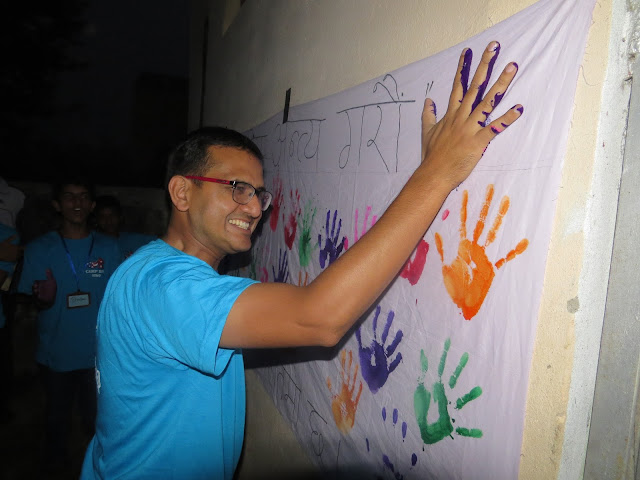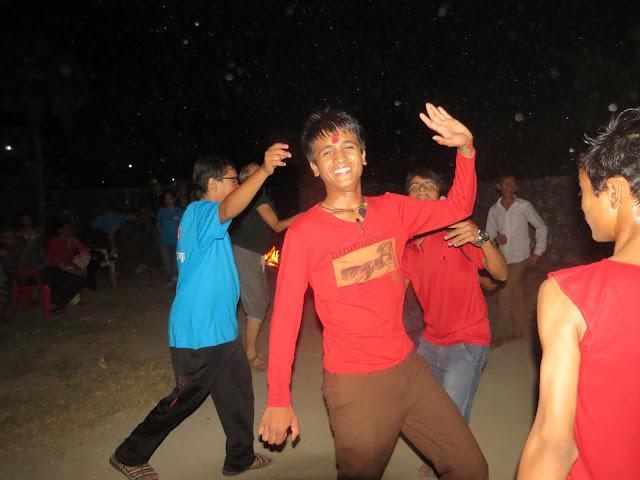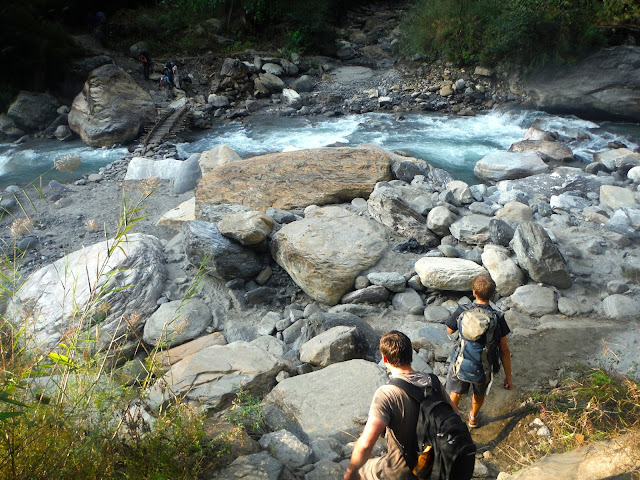I’m writing this on a borrowed
computer (my laptop’s revival was short-lived).
After two months of agonizing
tedium, the past 30 days have flown by. Following a tremendously successful
five-day boys’ camp (post and photos to come), I traveled to Kathmandu to
attend my volunteer group’s Close of Service Conference. On the way, I stopped
for a day at Lumbini, the birthplace of Siddhartha Gotama, better known as
Buddha. Cameraless, I was unable to capture all the monasteries, monuments, and
temples that comprise the World Heritage site’s sprawling three square miles,
but the solitary day gave me the opportunity for reflection and peace, at least
until I fell off my rented bicycle and ripped my pants.
Our Close of Service Conference
consisted of two days of workshops on resume writing, interview etiquette, evaluation of the program, and
eventual goodbyes. The newly arrived ambassador to Nepal delivered some heartening remarks
and the director of the Peace Corps Nepal program kindly invited us to his home for a
reception. Over the next few days, nearly everyone in my group would depart Nepal and scatter across Asia. At this point, of the sixteen of us completing our service, only one
other volunteer and myself remain in country. Four of our number are extending
their service in Nepal.
After the conference, I traveled
with another volunteer to Sindhupalchok to see my training host family for
the last time. Though their situation has improved little, my host parents seem in better
spirits than when I last visited in June. They and several other families have
received aid from Himalayan Climate Initiative, the organization that a group
of Nepal Peace Corps Volunteers partnered with to rebuild our training communities.
After a nice evening together, my host parents sent me off early in the morning
with hugs, a Nepali dhaka topi (traditional
hat), and a large bag of persimmons that I ended up passing off to hotel staff
in Kathmandu.
The next day, I set out for the
tourist hub of Pokhara for a weeklong trek up to Annapurna Base Camp with
Jacobo, another Peace Corps Volunteer. I spent most of the seven-hour bus ride to Pokhara chatting with the guy next to me, an outgoing British construction project
manager named Alex. With borrowed socks, sleeping back, and camelback,
secondhand guidebook and coat, and newly purchased trail-running shoes and poncho, I
secured the requisite trekking permits and planned out the route for the week.
Here are my daily notes on how it played out:
Day 1:
Sleep in to 6:30. Slow breakfast
in Pokhara with Peace Corps friends. Jacobo and I catch a cab to Hari Chowk and
climb aboard a bus with no vacant seats. We ride rooftop with a man and his
son, who chat with us about the fuel shortage and Pokhara’s
exceptionally pure Nepali language. Long lines of motorbikes, buses, taxis at
petrol pumps. Arrive in Phedi, our starting point, after about 45 minutes.
First steps at 10:15.
On the stairs, confronted by a group of children singing the classic Nepali folk song, “Resham Firiri”, for money. Almost don't let us pass when we decline to patronize. Meet several more solicitors in the coming two days, with always a battle to get by. Many steps up to Dhampus, leaving us with a nice view of the valley behind us.
The ACAP and TIMS trekking permit officials are unimpressed at our Nepali language skills. Downhill from Bhichok Deurali. Tree tomatoes all around.

Egg curry in a teashop with a tree trunk beehive. We identify a tree whose flowers smell like semen. Clouds obscure the view far ahead, but the weather couldn't be better.
Pass through Tolka, our planned destination, around 2:30 and decide to push on to Landruk. School children beg for candy, one for "one hundred." "Best friend," they say "give me chocolate." Three schoolgirls offer us unripe oranges, one of which falls to the ground and rolls off the cliff. They recommend a friend's guesthouse ahead.
4:30 and the beginning of Landruk. Beckoned by a high-pitched Nepali man, who offers us lodging gratis. The hot shower promised isn't so. Read a bit from Tales from the Arabian Nights as a lonely middle-aged American man tries to make small talk; failing, he goes to watch wrestling unenthusiastically with the porters. Dine on daal bhaat and hot water. Revitalized. Teach Jacobo how to play Texas Hold'em with dried peas and cashews as chips. Lose to him in six hands. Fall asleep with the lights on before 9.
Day 2:
Wake at 6 to a spectacular view of
Annapurna South through the north-facing window. Chat with a British forester
over a light breakfast of muesli. Too light; still hungry. On the road at 8:15.
Descend toward New Bridge, past some beautiful waterfalls. Cross the Modi Khola on a suspension bridge tentatively, with a dog at my heels.
Long climb up to Jhinudanda; at the top, reward ourselves with a rest and a light snack. Descend twenty minutes to the hot springs alongside the river, where we meet a Swiss, Spanish, and Czech guy on their way back down. Water wonderful; river shockingly cold. Creepy Nepali man watches us change into dry underwear.
Stairs up to Chomrong. Two goats butting heads on the precipitous path, one eventually pushed off the hill as their shepherd looks on and laughs. Stop to treat our water with iodine tabs; tastes somehow better than plain water. Light rain begins to fall; we throw on coats and continue climbing. Lunch on burritos and chocolate cake as the clouds part over the great Himalaya beyond.
Running down stairs to a steel suspension bridge. More stairs up to Sinuwa.
Settle down at a guesthouse at the top of the Sinuwa. Cute Gurung girl calls me handsy (means handsome?). Stretching session and foam rolling to loosen taut legs. Teach Jacobo Blackjack and Spit after dinner—new card games becoming a nightly ritual. Colder than last night. Asleep at 8:30.
Day 3:
Rise at 6 feeling fresh. Heavier
breakfast today, with an egg on fried Gurung bread to supplement our muesli.
Begin at 7:45. Realize within half an hour that we actually stayed at a
village lower then Sinuwa the night before; spells a longer day ahead.

Clear skies show the sharp peak of Machapuchre, the Fishtail, to the northeast, looming ever above as we approach.
Path to Doban and Bamboo passes through jungles of bamboo and rhododendron. Barbed wire on a low boundary seems odd. Waterfalls on the ridge to the east.
Gradually climb to Himalaya, where I need a break. Fog rolls in rapidly, reducing visibility to ten meters or so.
Climb steep rocks to Hinko Cave—more of a large rock outcrop, if you ask me. Pass over mountain streams as rain, then small bits of hail pour down on us.
Trash heap marks the beginning of Deurali at around 2. On last legs after climbing a thousand meters today, with many rises and falls in between. The topmost guest house owner refuses to reduce the rate, so we descend to seek out more accommodating accommodations.
Enter a guest house to find Alex, the friendly Brit from the bus, having coffee with his porter Karka and Spanish friend Lucia. An American couple, Shree and Wendy, join us. Very cold. Snow, now rain, now hail fall sporadically all afternoon. Teach Shithead and Coldbreak, a Nepali game, to our friends. Pass around Shree's Native American flute, which we all give a go. Too much energy tonight—difficult to fall asleep.
Day 4:
Warm under the thick blanket at 6;
tough to get out of bed. Urine steams on descent into the squat toilet. Dusting of ice and snow outside. Egg veg soup hits the spot.
On the trail at 7:30. Set out together with Alex and Lucia, but Jacobo and I push on ahead. Yesterday's hail makes for hellish trails—a few slips early on. Enter a wide valley cut by a river: the gateway to the Annapurna Sanctuary. Large boulders block up the riverbed, diverting the current here and there. Sparse groves of bamboo and birch; otherwise desolation. The looming mountains beautiful beyond photographic capacity, their faces platinum-like in the early morning light. Waterfalls spew forth almost in slow motion in the frigid expanse. Rock cairns dot the riverside.
We begin to climb; the snow deepens to a few inches. Porters barreling down force us to throw ourselves aside. Mint plants under a tarp; the frosted leaves taste like a mohito. Reach Machapuchre Base Camp just as the sun rises over the peaks, lighting up the snow with blinding intensity. Wish I'd brought sunglasses. And gloves. And a hat.
Need to acclimate for some time to the world at 3700 meters. Sit for a few minutes at a lodge to take in the panorama of peaks. Shree and Wendy emerge, followed soon by Alex and Lucia.
We all decide to settle here for today, and to climb to ABC tomorrow for the sunrise. Cards all day in the Annapurna Sanctuary (forgive me, Father?). Face flushed, burning with heat; punishment for sunscreen neglect. Daal bhaat for dinner skimpy on vegetables and taste. 8PM bedtime for the early morning to come.
Day 5:
Awake at 4:45 and out the door by 5
with Alex and Jacobo, toward Annapurna Base Camp. Total darkness at first, but
the eyes adjust. Moonlight casts shadows on the snow ahead of us. Shooting star
to the south; interstellar visibility greater than we've ever beheld.
No flashlights; we put our faith in the footsteps of those before us. Coldness
all-consuming. Fatigue sets in faster than normal in the thinner air. Attention
focused yet disperse as we climb.
Reach camp at 6, a few minutes before the dawn light hits the western Annapurna peaks, pinkish in the sun still hiding behind Machapuchre’s eastern face. Worth every minute, penny, and bit of imaginable currency. Take some photos and descend within half an hour due to cold.
Jogging down the path, Jacobo realizes he's dropped his phone. What an idiot. The search party ascends, and Alex finds it. Resume running down. I lose the camera. What an idiot. Spot the cord just poking out of the snow twenty yards back. Jacobo's worn soles send him tumbling several times on the slick stairs.
MBC at 7; gather our things and begin the long descent. Talk of a cappella, relationships, taxes, masturbation, the fall of Abiza. Much farting. Establishment of a point system to penalize falls and flatulence.
I attempt to drink mountain water at a stream and, slipping on the stones, nearly fall in. Foot soaked; sock change required. Strip down to t-shirts and shorts at Hinko Cave.
Himalaya, Doban, and Bamboo fly by. All knees hurting as we continue down, down. Greeting game becomes a humorous distraction: the first person says "Howdy," the second "Cheers," the third "G'Day, sport!" to passersby. Laughter every time. Lunch service slow at Bamboo, but the ravioli-like veg and cheese momos are worth the wait.
Countless steps up from Bamboo; monkeys cries from the jungle opposite. After the greyscale of the snowy mountains, the colors seem so vivid.
Reunification with a semen tree above Sinuwa. Further on, a herd of seven water buffalo block our way; we tiptoe past. Nearly step on a snake descending to the suspension bridge and scream in fright.
Climb more than 2000 steps (I count) up to the top of Chomrong to end the day at 3:30. Distance traveled today: 24 miles.
Group stretch on the roof. Hot shower in mismatched borrowed flipflops; feeling like a king. Daal bhaat and raksi (local millet wine) for dinner, as ten rowdy Koreans down kimchi and whiskey in the table across. They disappear, emerging an hour later having gone to get pizza and pray, they say. We consume three bottles of raksi over another evening of cards. Climb into bed around 11, but listen to Adele's Someone Like You before turning in. Alex snores like a train.
Day 6:
Eyes open at 6 from sleep unsound.
Head hurts some; knees stiff as boards. Mountains cloudy from here; thank our
stars for the good views yesterday.
Nine Koreans praying downstairs; the tenth takes photos. Banana pancakes with honey; phone call home to check in. Leave at 7:15. Downhill abounding; only ibuprofen makes it possible. Down, down, down.
Less chatter today. Past Jhinudanda and New Bridge in no time. Fall in with a Spanish girl who volunteers at a school in Pokhara. She and Jacobo converse in Spanish.
Alex and I take what we believe to be a short side path—end up in some rice fields high above the main trail. Both welcome the detour from the beaten path. Spot a snake similar to yesterday's.
Reach the Siwai bus stop by 10:30 and find a jeep ready to depart for Pokhara. The four of us squeeze into the back seat. Dirt road leads past Birethanti and Nayapul, out to the main road. So tired that I sleep with my head in my lap. Blow a tire coming down a hill—Alex kicks into gear and changes it shortly.


Pokhara at 2:15. Spanish girl got off earlier and forgot to pay, so we reluctantly cover her fare. Entering our hotel, an Israeli guy mistakes us for his kinsmen. Daal bhaat for lunch; a shower, a shave, and a massage. Jacobo and I head to meet Alex at a Japanese restaurant only to find it closed; wander the streets looking for him. Spot him coming out of a bar. Decide on Korean for dinner; reject two restaurants due to sketchiness. Food of unparalleled taste; we ravenous from six days of trekking. Next, to a bar with overpriced drinks and a four-man acoustic cover band. Return to the room after 11; feels like past 1. The Israelis noisy in the courtyard below, but I drift off in no time.















































































































































































































































































